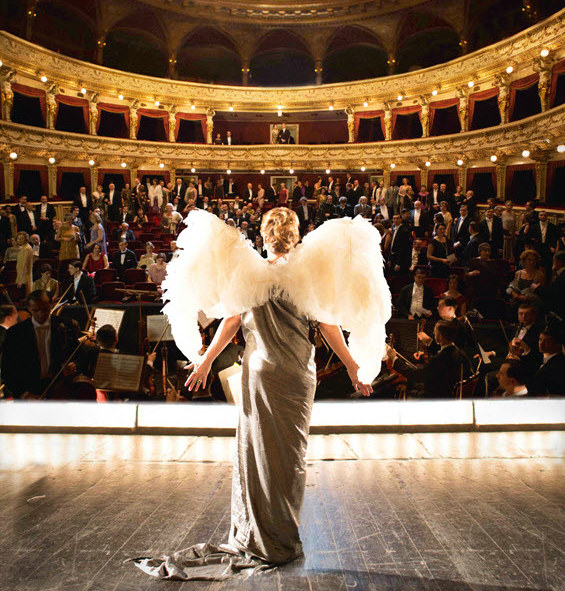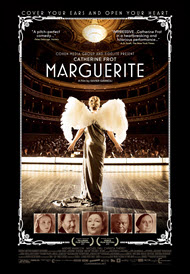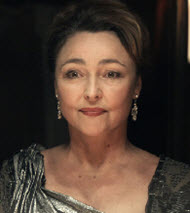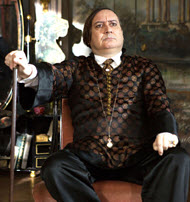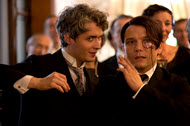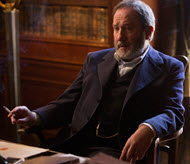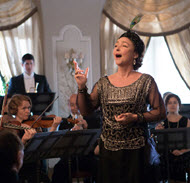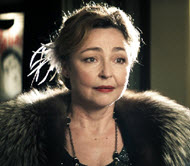Marguerite
 for brief graphic nudity and sexual content, and a scene of drug use.
for brief graphic nudity and sexual content, and a scene of drug use.
Reviewed by: Jim O'Neill
CONTRIBUTOR
| Moral Rating: | Offensive—due to “brief graphic nudity and sexual content” |
| Moviemaking Quality: |
|
| Primary Audience: | Adults |
| Genre: | Drama |
| Length: | 2 hr. 9 min. |
| Year of Release: | 2015 |
| USA Release: |
March 11, 2016 (limited—3 theaters) March 18, 2016 (14 theaters) April 1, 22016 (46 theaters) DVD: August 2, 2016 |
| Featuring |
|---|
|
Catherine Frot … Marguerite Dumont André Marcon … Georges Dumont Michel Fau … Atos Pezzini Christa Théret … Hazel Denis Mpunga … Madelbos Sylvain Dieuaide … Lucien Beaumont Aubert Fenoy … Kyrill Von Priest Sophia Leboutte … Félicité la barbue Théo Cholbi … Diego Astrid Whettnall … Françoise Bellaire See all » |
| Director |
|
Xavier Giannoli |
| Producer |
|
Fidélité Films Gabriel See all » |
| Distributor |
| Cohen Media Group |
“Cover your ears and open your heart”
Xavier Giannoli’s French language film, “Marguerite” is loosely—very loosely—based on the life of American socialite Florence Foster Jenkins who used her considerable financial resources to stage musical recitals in which she sang bel canto arias. “Bel” or even “canto” fail to describe her vocal style, a mixture of garble and screech that makes sophisticated listeners laugh with condescension, and everyone else reach for earplugs or scramble for the nearest exit.
Later this year, a film biopic about Jenkins’ life will be released with Meryl Streep playing the tone-deaf but determined singer. That movie may be more factual than the French film, but I doubt that it will be near as good. And Streep, although an adequate vocalist, and at times an inspired imitator, will find it hard to match the tour de force performance given by Catherine Frot, a consummate comedienne who combines droll humor and heart breaking pathos to elevate a deluded would-be chanteuse to a woman of grace and beauty.
In Frot’s magical hands, “Marguerite” is enchanting and well deserving of an audience’s affection. Your eardrums may strain or even pop when she sings, but it’s hard not to root for this warm and delightful lady. She may be a joke to Parisian elites (as Jenkins was to New York society in the 1930s and 40s), but she is never their fool, even when she sashays toward the spotlight donning some remarkably silly costumes: a single upright peacock feather attached to a headband, a draped white sheet on which battle scenes are projected, and a pair of billowy angel wings fastened to her back. She rules her domain, not with bravado and pique, but with charity and good will. Even though she is ultimately a tragic heroine, she is primarily a brave and a spirited one.
Frot, along with her superb supporting cast, production designers, and writers (Giannoli co-wrote the script with Marcia Romano) have produced a gem of a movie, one of the best I’ve seen in some time.
Baroness Marguerite Dumont resides in grand bohemian style in a mansion outside Paris in the 1920s. She lives with her husband Georges (Andre Marcon), who loves her, but cannot tell her the truth about her singing, and a large staff that is headed by a doting butler named Madelbos (Denis Mpunga).
Georges wants his wife to give up singing, but lacks the courage to tell her why, while Madelbos protects and coddles her, and even takes posterity photos of her dressed in exotic opera costumes. The pictures are as puzzling and as gaudy as Marguerite’s performances, but they have a haunting charm. They tell the story of a heart yearning for someone to listen to its beat.
The relationship between Marguerite and Madelbos is a panoply of twists and turns. It appears to stick to “Downton Abbey” type conventions of how gentry and servants relate, or even steal from the Norma Desmond/Max scenario of “Sunset Boulevard.” I thought things would play out the same way “…Boulevard” did. The end of that movie contains one of the most poignant scenes in film history. As the former silent screen star descends the staircase consumed by madness, a bevy of photographers stand ready to capture the mighty downfall, but not a single flashbulb goes off. Overcome with compassion and empathy, the cameramen hold back. No one snaps a photo.
I was wrong about Marguerite’s fate being a mirror of Norma’s. Madelbos may be loyal, but he is no Max. The movie is full of such surprises, some warming, some jolting, but none of them predictable. “Marguerite” may be a based on something else story, but it rises above that cliché to become a true original.
Marguerite’s tin ear may block some self-awareness, where her talent is concerned, but it belies an innocence that allows her to see the good in people, and compels her to do good for others. She is never cruel, the way her pretend-admirers can be. She is generous to young talents, to opportunistic journalists, and even to people who use her to achieve their own dubious ends. She has an unbreakable faith in art (a mediocre performance of “Vesti la Giubba” from Pagliacci becomes an epiphany for her), and unlike the cynics who surround her, she hopes for the great things that such a faith promises.
Innocence unchecked can thwart wisdom and make one infantile, but Marguerite grows in virtues and in smarts, if not in talent. When she auditions for vocal coach Atos Pezzini (Michel Fau), she crows Cherubino’s aria from “The Marriage of Figaro,” and one waits for him to do a Simon Callow turn or to pass out. Fau’s restrained expressions during the spine scratching performance make for some of the film’s funniest moments. Yet Pezzini’s disdain and pomposity prove no match for Marguerite’s purity of intention and heart. He too is taken in by her energy and spirit, enough so that he almost makes her a singer.
Their sessions bring to mind another Hollywood movie, “Whatever Happened to Baby Jane” (1962), in which a soulless Edwin Flagg (Victor Buono) finds himself coaching Bette Davis’ Jane Hudson, a performer who has a past but no present and no future. That movie was an exercise is depravity and despair, and it is now a camp classic. Giannoli’s film never wallows in hopelessness. Each of its revelations is an affirming one. Its central figure redeems her audience by opening their eyes to what life means, and to the kind of joy it can bring.
Marguerite’s singing may be wanting, but her life and her story hit all the right notes. So does this marvelous, and gallant, film.
Violence: Mild / Profanity: Moderate / Sex/Nudity: Moderate
See list of Relevant Issues—questions-and-answers.


PLEASE share your observations and insights to be posted here.
